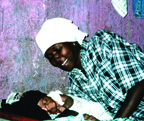The Third Joyful Mystery
The Birth of Jesus
By May/June 2009
Return to Table of Contents
Print Article
Incarnation: God-with-us
“While they were in Bethlehem, the time came for her to have her baby. She gave birth to her first son, wrapped him in strips of cloth and laid him in a manger—there was no room for them to stay in the inn.” Luke 2:6-7
Mary and Joseph, tired, weary, exhausted, arrive in Bethlehem. They are scared: the difficulty of the journey has had its effect on Mary and she feels that the time has come to give birth. They can find no place to stay; eventually an innkeeper provides an abode for them among the animals.
Then the miracle happens: their son is born, their firstborn, and they name him Emmanuel, “God with us.” In the days that follow, their astonishment increases with the visit of the shepherds from the region, and foreign kings from afar bearing precious gifts. In their hearts, Mary and Joseph know that what God spoke to them through angels and dreams has come true. This is God’s Son.
During each Advent we relive Mary and Joseph’s awaiting of their son. At Christmas, we celebrate his birth. We are reminded of God’s choosing to be born as a migrant, someone on the move, without a place to stay. We note that the first group to whom Jesus’ birth is announced is the shepherds, poor men tending their flocks in the countryside, social outcasts unable to go to the temple to offer the ritual sacrifice. The three kings represent the universality of God’s birth: his Son was born for all peoples, all nations, all times. We, too, join them at the stable before the Child Jesus. Like the shepherds, we offer them our poverty; like the three kings, we offer the best of our hearts.
Mission Call
As missionaries we have been called to witness Jesus’ birth in other lands and cultures. The three kings represent the cross-cultural aspect of Jesus’ mission: he has come for all peoples. So we, too, go out to other lands. Another important aspect is represented by the shepherds: we are called to make a preferential option for the poor, to place ourselves in solidarity with social outcasts in all situations. Finally, Jesus’ birth in a stable, with his parents on the move, calls us to be itinerants as well, to become like migrants or nomads.
As we pray this decade of the rosary, let us ponder: How is Jesus born into my life through other people and events? Is there room for him in the inn of my heart? Let us remember the poor, the migrants, and the immigrants in our world. Let us pray that the celebration of Christmas may be less consumerist and more in tune with service to others.
Amazon Word
It is Sunday afternoon. A call comes from Helena, a Makuxi woman. “My neighbour Antonia is about to give birth!” she says. “There are no buses running. Padre, could you take her to the hospital?” I drive 40 minutes there, leaving Antonia and her niece at the hospital. What a blessing—new life! Later, at 10 o’clock that night, Antonia calls. “Padre, I haven’t given birth yet and there is no room at the hospital. Could you drive me back home?” When I arrive at the hospital, I see five other pregnant women waiting for rides. What lack of health service. I leave Antonia at home. The next day, she goes to the hospital by bus and eventually gives birth.
Return to Table of Contents
Print Article
